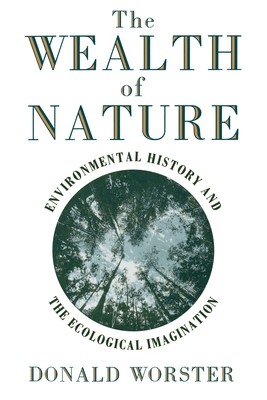
- We will send in 10–14 business days.
- Author: Donald Worster
- Publisher: Oxford University Press, USA
- ISBN-10: 0195092643
- ISBN-13: 9780195092646
- Format: 15.9 x 23.4 x 1.5 cm, softcover
- Language: English
- SAVE -10% with code: EXTRA
Reviews
Description
Hailed as "one of the most eminent environmental historians of the West" by Alan Brinkley in The New York Times Book Review, Donald Worster has been a leader in reshaping the study of American history. Winner of the prestigious Bancroft Prize for his book Dust Bowl, Worster has helped bring humanity's interaction with nature to the forefront of historical thinking. Now, in The Wealth of Nature, he offers a series of thoughtful, eloquent essays which lay out his views on environmental history, tying the study of the past to today's agenda for change.
The Wealth of Nature captures the fruit of what Worster calls "my own intellectual turning to the land." History, he writes, represents a dialogue between humanity and nature--though it is usually reported as if it were simple dictation. Worster takes as his point of departure the approach expressed early on by Aldo Leopold, who stresses the importance of nature in determining human history; Leopold pointed out that the spread of bluegrass in Kentucky, for instance, created new pastures and fed the rush of American settlers across the Appalachians, which affected the contest between Britain, France, and the U.S. for control of the area. Worster's own work offers an even more subtly textured understanding, noting in this example, for instance, that bluegrass itself was an import from the Old World which supplanted native vegetation--a form of "environmental imperialism." He ranges across such areas as agriculture, water development, and other questions, examining them as
environmental issues, showing how they have affected--and continue to affect--human settlement. Environmental history, he argues, is not simply the history of rural and wilderness areas; cities clearly have a tremendous impact on the land, on which they depend for their existence. He argues for a comprehensive approach to understanding our past as well as our present in environmental terms.
"Nostalgia runs all through this society," Worster writes, "fortunately, for it may be our only hope of salvation." These reflective and engaging essays capture the fascination of environmental history--and the beauty of nature lost or endangered--underscoring the importance of intelligent action in the present.
EXTRA 10 % discount with code: EXTRA
The promotion ends in 19d.19:50:15
The discount code is valid when purchasing from 10 €. Discounts do not stack.
- Author: Donald Worster
- Publisher: Oxford University Press, USA
- ISBN-10: 0195092643
- ISBN-13: 9780195092646
- Format: 15.9 x 23.4 x 1.5 cm, softcover
- Language: English English
Hailed as "one of the most eminent environmental historians of the West" by Alan Brinkley in The New York Times Book Review, Donald Worster has been a leader in reshaping the study of American history. Winner of the prestigious Bancroft Prize for his book Dust Bowl, Worster has helped bring humanity's interaction with nature to the forefront of historical thinking. Now, in The Wealth of Nature, he offers a series of thoughtful, eloquent essays which lay out his views on environmental history, tying the study of the past to today's agenda for change.
The Wealth of Nature captures the fruit of what Worster calls "my own intellectual turning to the land." History, he writes, represents a dialogue between humanity and nature--though it is usually reported as if it were simple dictation. Worster takes as his point of departure the approach expressed early on by Aldo Leopold, who stresses the importance of nature in determining human history; Leopold pointed out that the spread of bluegrass in Kentucky, for instance, created new pastures and fed the rush of American settlers across the Appalachians, which affected the contest between Britain, France, and the U.S. for control of the area. Worster's own work offers an even more subtly textured understanding, noting in this example, for instance, that bluegrass itself was an import from the Old World which supplanted native vegetation--a form of "environmental imperialism." He ranges across such areas as agriculture, water development, and other questions, examining them as
environmental issues, showing how they have affected--and continue to affect--human settlement. Environmental history, he argues, is not simply the history of rural and wilderness areas; cities clearly have a tremendous impact on the land, on which they depend for their existence. He argues for a comprehensive approach to understanding our past as well as our present in environmental terms.
"Nostalgia runs all through this society," Worster writes, "fortunately, for it may be our only hope of salvation." These reflective and engaging essays capture the fascination of environmental history--and the beauty of nature lost or endangered--underscoring the importance of intelligent action in the present.


Reviews